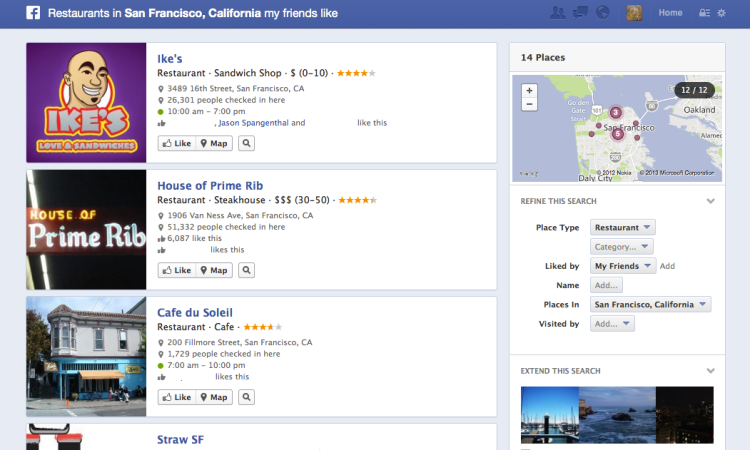Facebook says it likes to move fast, but it took its sweet time rolling out one feature to mobile devices.
A year after introducing its Graph Search tool for more broadly searching data sitting on the social network, Facebook appears to be starting the process of releasing Graph Search on smartphones and tablets.
Seth Fiegerman, a reporter at Mashable, tweeted out a screen shot of an apparent tutorial for Graph Search running on a mobile device:
Just got Graph Search on the Facebook app pic.twitter.com/NPXhWUgKtK
— Seth Fiegerman (@sfiegerman) February 1, 2014
It wasn’t on my iPhone today, so Facebook has rolled out the feature to only part of its user base.
And we have no idea when Graph Search will become available on Android devices or for people whose Facebook accounts use languages other than English.
Plus, at least as far back as last March, engineers were working on adding more content that can appear in Graph Search’s search results, like comments and Facebook posts. That capability hasn’t reached me yet, anyway.
Still, the arrival of Graph Search on at least some mobile devices in the world means it’s becoming easier to mine the social network in new ways for people, places, cultural works, and other things that people mention by name on their Facebook pages.
From a big data perspective, too, Graph Search on mobile devices is an achievement worth noting. Graph Search is a good example of natural-language processing (NLP), which is a technique that lets applications accept raw, random strings of words from millions and millions of people and spit out clean information in response.
A handful of companies have succeeded at running NLP applications at scale. Microsoft has done it with voice recognition in Xbox. Google does it with voice recognition in search. Apple has its well known Siri application for carrying on conversations with mobile device owners. And now Facebook is gradually giving users more ways to search across its vast pool of user-generated information for wisdom on matters like which restaurants are worth visiting, which musicians are popular among a user’s friends, which friends have moved to a certain city recently, and which users work at certain companies.
At the same time, with Graph Search showing up on more screens, more people will see all the data that Facebook makes available in Graph Search. That could raise more privacy concerns about the social network. Fortunately, it’s possible to clean up your profile, so you don’t inadvertently get spotted in search results for belonging to a embarrassing Facebook group that you really should have ditched when you graduated from college.
In its short life, Graph Search has already led to some good things. Like finding the original owner of a 20-year-old T-shirt. Now that sort of occurrence could become more common.
Hat tip: The Verge
VentureBeat's mission is to be a digital town square for technical decision-makers to gain knowledge about transformative enterprise technology and transact. Learn More

